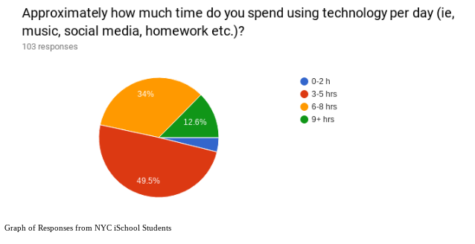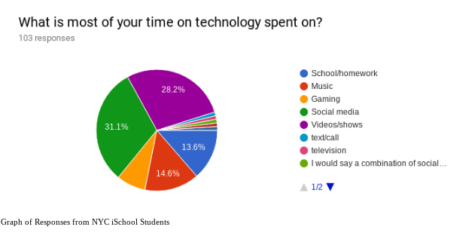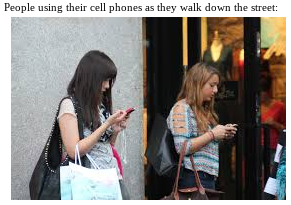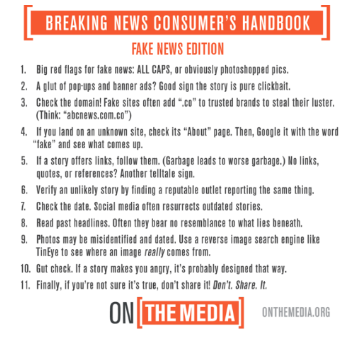Where the day went

November 7, 2018
“We usually type on computers for writing, and after writing, we sometimes have library media and we use computers there,” says David Johnson, a fifth grade student, talking about his school.
“In my teenage years I was out with friends for a lot of the after school day, interacting with lots of people,” Jill Cuniff remembers.
Which one of these is your ideal? You might be reading the first one and being glad that technology is available, or looking at the second one with nostalgia, or both.
So how much does technology influence our lives? Does it have more effects than you thought?
All of these things contribute to the question: where did the day go?
How Much Time do We Spend on Technology, and What are We Doing with It?
The average amount of time for American teenagers to be on technology is generally considered to be about nine hours per day. But when we distributed a survey to our high school, the majority of people reported spending 3-5 hours on technology.

If your mind jumped to “what a waste of time!” you’re not alone.
Many people use technology for several hours each day, so we wanted to find out what technology is being used for. Most people who took the survey responded that they mostly use it for watching videos and shows, or for social media. A lot also said homework, or listening to music.

Using these statistics, we can justify using technology for several hours daily.
Imagine this: as you ride on the train to and from school, you listen to music. At school, you take notes using a laptop. When you get home, you have to work on your essay, using a word processor, and your online homework questions. Then you go on your phone for an hour or so. After that, you go about your day: extracurriculars, errands, dinner, etc. Later that evening, you watch a movie at your house with your family, or a few episodes on Netflix before bed. This is an example of how we could be using tech for a large chunk of our day while still being present in society.
One student’s survey response reads: “It all depends on the day of the week to be honest. Weekdays it’s Homework/Music. But, I would have to say overall my time spent on technology would most likely be Gaming/Videos/Music. Very rarely I use social media.”
The Evolution of Technology
Computers perform many functions, and many of these replaced things we did before technology came to be. For example instead of search engines, there were encyclopedias for word processors, there were typewriters for email, there was normal mailing. All of these were replaced by the computer.
Some may argue that they miss the wonder of encyclopedias, the excitement of opening a letter, and the meaningfulness of writing one. Others may say that they much prefer phones and computers, as they are faster, portable, and more compact.

According to Matthew Johnson, television started with only 5 channels, and then when cable was invented more were added. There were 15 channels, and then 50.
When personal computers were first created in 1974 , they didn’t even have a keyboard -, they were merely a box with switches to input data. Because of how difficult they were to use, not many people owned them. As they became more advanced, they became easier to use.
In 1977 Steve Jobs and Stephen Wozniak created Apple II, which was the first computer to have a keyboard and a color screen. When the Apple II was created, the company which made it encouraged people to make programs for it to make them more useful for everyday life. This computer was what put personal computers on the market as something that was useful for everyone no matter how skilled you were.
The internet also connects us around the world and allows us to maintain relationships with people miles away. “I can set a book in Venezuela and effectively do that because I can just look at Youtube videos and websites and everything like that and get a …decent impression of what Venezuela is like,” says Ms. Goldman.
Aside from the internet, technology has also changed music and art. Musician and artist Jill Cunniff started her career in the 1990s. She says, “It’s been interesting to watch how music flies across the internet. Anything can happen to a song or video if it goes viral or a lot of people shareit on social media. Record companies used to use distributors to move records and cds around the country and the only way people heard new music was through radio, television or press, or if you went to a concert. We have many more outlets now to spread information. It’s such a huge universe, though, that it can feel impossible to be discovered or get anyone to notice you as a musician. There are so many choices that people are less likely to find your music in the ocean of information. In the old days, if you had some press you could get a fan base started.”
Cunniff believes that breaking into the music industry was easier in the time before technology, and it was easier to make money selling music. Streaming music is becoming the dominant form of listening, and artists are paid very poorly per stream. It is possible that the payments will increase as time goes on, especially because activists have been pushing Congress for modernized payment systems, and the Music Modernization Act just was signed into law. This act improves the streaming payment for songwriters, and makes it easier to license music from artists.
Today, there is a lot of advanced technology. For example, almost everyone over the age of about 12 has a cell phone, we have voice activated Google Home and Amazon Echo products. Matthew Johnson also describes that people have come to depend on technology, because everyone expects you to have it. With every adult, many have almost no doubt that there is a cell phone in their pocket. People who don’t have a cell phone may even feel excluded from society.
Technology in Schoolwork and Learning
A majority of modern classes use computers and other forms of technology to assist with learning. This may be make it harder for students to focus while they are in class.
When reading something digitally one may find it harder to concentrate on and retain information from the text than if you were to read it on paper, and there is a reason for this:
When reading something digitally there are a lot of distractions. This includes bright lights, ads, links and many others, all of which can derail your brain and prevent you from reading and understanding what you’ve read. When reading something on paper, there is only the words, which makes it much easier to process information as you read it.
Therapist Donna Arking believes that copying notes off a slideshow is unhelpful. This way you are not thinking about the information that you write down.
However, technology does have some positive effects on children’s learning. Since there is always information at our fingertips, our brains don’t have to focus on memory, but instead can perform higher functions.
Kids can use technology to research topics for school, take notes, or write essays. Kids can use technology to learn about the world. Before there was so much technology available, students would need to do their research at libraries and then usually hand write their project. This is much more difficult than the modern equivalent of using google to do research and then writing on a word processor.
Growing Up with Technology
Today’s youngest generation has had access to modern and advanced technologies for as long as they can remember. Due to this, their life experience will be completely different than any previous generation. Since this is so new, nobody knows how it will turn out. So far, we have seen many benefits but also many drawbacks.
One issue with growing up with technology is something which was named “Elsagate”. Elsagate refers to the issue of videos on Youtube which seem kid-friendly but end up being scary or inappropriate. This may not seem like a big deal, but it has a major effect on the young children who end up watching the videos. Oftentimes the videos will be called something seemingly innocent, for example “Peppa Pig Goes to the Dentist” but will then show Peppa Pig crying in pain! While this is not the worst of Elsagate, it could still be very upsetting for a young child watching. Elsagate is not the only scary thing on the internet and each and every thing that could be traumatic is becoming increasingly harder to avoid.
Because of this and other potentially inappropriate or scary content, many parents opt to put parental controls on their children’s devices. Parental controls limit the amount of time their child is spending on technology.
However, if we are aware of these dangers and how to avoid them, technology can be a really good resource for kids.
They can use it to Facetime someone who they miss who is far away. They can have a much stronger connection that way rather than just sending a letter or making a phone call.
Technology can also help kids relax when they are in a bad mood. Watching your favorite show can cheer you up after a hard day.
In Silicon Valley, parents are up in arms about children and tech. They have decided that screens are bad, and so their nannies are not allowed to be seen on a smartphone. The children are taught to play board games and cards.
These technology workers are the very people creating screen activities. Wealthy parents are increasingly restricting their children’s technology access.
At this time, we don’t have enough information to say if screen time is a positive or a negative for children and teens. Psychologists are concerned that tech was purposely made to be addictive and endlessly time consuming. These concerns are growing in many sectors of society.
Originally, when technology started to become more mainstream and advanced, we worried that this would create a divide between low and high income families, giving high income families greater knowledge and access to technology. This was known as the “Digital Divide”. However, recently the divide has reversed, with high income families rejecting technology. Private schools are now offering tech-free play only, and public schools are still advertising their technology. This also is in line with the data showing that low income teenagers spend 8 to 9 hours a day on screens, while higher income teens spend an average of 5.
Opinions
Various people have a very strong opinions on technology especially since it has become so advanced and popular in recent years. Parents are increasingly concerned that their kids are going to lose their social skills and suffer in adult life.
Jacqueline Goldman is a writer and has a negative view on technology: “I look on the subway I look on the sidewalk I can’t believe it, it’s like the zombie apocalypse, like a bunch of cyborgs,” Goldman remarks. What Goldman is referring to is how when she looks around everyone is on their phones.
It’s a common belief that today’s youth is missing out on many activities because of their dependence on technology. “The quality is not the same. The thinking is not the same. It’s just different,” she says.
While many people from previous generations may have a more negative viewpoint, many people love it.
Jacqueline’s son, David Johnson, particularly enjoys coding. When discussing it he states, “when technology is used right you can do a lot of stuff. I love to code, I think it’s just fascinating, and I just think that it’s amazing.” David loves technology. He particularly loves to code and play video games.
David’s opinion on tech is shared by many, especially, digital natives like himself ,and Jacqueline’s view is shared by many as well, again mostly people from generations before the digital age. These two viewpoints often clash especially when it comes to parent-child relationships.
What People Did With Their Time Before and in Earlier Stages of Technology
There is no doubt that we spend a lot of our time using technology, and a lot of people wonder if more was getting done before we had all of this. One prominent theory is that since we spend so much time on screens we are missing out on opportunities to be more productive.
Jill Cunniff started her career in a time before technology became such a big part of our lives. In her opinion the fact that so much non-stop entertainment is available could be damaging to people’s creativity. “Because there was no technology we did get creative… I feel like I had free time that I needed to fill and I did it with artwork and music.” Cunniff feels that boredom and time are necessary parts of the creative process. “I went to a high school that had less class time than regular high school. That gave me the time to pursue songwriting and painting for many hours each day. I have no doubt that if that were me today, I would be tempted to spend those hours on technology.”
While people in previous generations might’ve had more free time, they weren’t always using it productively. Drug usage in teenagers has gone down drastically with the popularisation of technology, which could imply that we may be better off with technology, but that’s all up for discussion.
Health Effects of Technology
People are concerned about technology’s effect on their health! Using phone emitting blue light before bed.
Technology can have many negative effects on how you sleep. Our bodies naturally create melatonin, a hormone that makes you sleep. Phone and computer screens have bright blue light, and looking at blue light, suppresses melatonin in our bodies, making it harder to sleep. This is why if we work on the computer or go on or phones before bed, it’s harder to sleep. From this,doctors recommend not using technology within an hour of going to sleep.
Another potential effect technology could have on the human body is that it might make it harder to focus.
This concept is heavily debated. Some studies show that people may have a harder time focusing with increased use of technology. Microsoft conducted one of the most credited studies about his topic and their research pointed to technology negatively affecting attention span.
Tech Effect on Relationships
Another concern about the digital age is that people don’t talk to each other as much. Since we spend such a large sum of our day using some sort of gadget, many question whether it is stopping us from having face to face conversation. Cunniff says, “We had places to hang out, like record stores, and on a given day we could meet fifteen people there. There are fewer places like this for teenagers as far as I can tell. Face to face connectivity is taking up less time per day.” In her opinion, Cunniff feels people aren’t using social skills enough.
While this may be true, all of the access we have to social media opens up the opportunity to talk to people more, even if they live across the world.
Because of this access, modern technology and social media have made long distance relationships more convenient, and therefore more common. Things like streaming movies simultaneously with someone in another location create a feeling of closeness that might not have been possible in another time.
People can use apps like Facetime to see in each other and talk. Countless people feel these things improve long distance relationships. Gifts can be sent in two days with services like Amazon Prime, and emails can go quickly to the other side of the world. Some researchers believe these services help keep long distance partners closer than previous forms of communication.
Even before people spent time using technology, there were still times when people couldn’t see their friends. While you could call them, texting and social media only makes it easier. Because of this many believe that even though we are seeing each other less, we are connecting more because of social media.
For example, a person could be alone in their room at 3 a.m., and still be communication with countless people across the globe who may be in different time zones. These kind of interactions expand our networks exponentially, whereas in earlier times, you might know your friends and their friends, today we are all capable of reaching across time zones and international borders spontaneously and immediately.
There is also the concern that families aren’t interacting as much and because of this the overall contentedness within families could be suffering. Because of all of the time people spend on technology, they may not be able to interact as much, but there is also the factor of creating a divide between parents and their children. Generational divides have always been present in parent child relationships, but technology just might make the differences larger.
Fake news
While technologyis an important tool to spread information, it could also spread misinformation. When fake news is published, on the internet, it could spread fast. “I think some disadvantages are if someone spreads lies on social media, and other people see those lies and think they’re truth… I think that can be really dangerous,” says Tamara Sokolowsky.
It’s important to be able to spot fake news and tell what’s fake and whats real. One way to spot fake news is to see if you can find similar stories from reliable news outlets. Another sign is all caps, or obviously photoshopped images. And if the url adds “.co” to the end of a url to a trusted site, then it’s probably a fake news site. These tips can help you not believe lies and rumors.

While negative info can spread on social media, positive info can spread, too. Social media can be a great way to promote yourself, and get your name or your voice out there. If you are trying to promote your business, you could make a website for it. It could be used to organize for a rally or event. “Someone with a small voice getting their thoughts out onto a larger audience, and if they have something really smart or good to say, they’re able to share it with many people.” Tamara explains.
We have benefited as a society in many ways because of new technology. Our lives have become more convenient, we have been able to connect with people far away, and spread information much faster. Many people still reminisce about before we had technology, and believe that we are missing out on experiences that technology is preventing, and it may be having negative effects on us. Whatever your stance is, technology has come a long way to be how it is today. It has had a massive influence on our society, and on ourselves as the first generation of digital natives. Procrastination, finding new music, writing a story, talking to your friends, or making a new one, learning about the world we live in, staying up late finishing an assignment, or even just finishing a series on Netflix, all of these things are just realities of this era, and that is where the day went.

